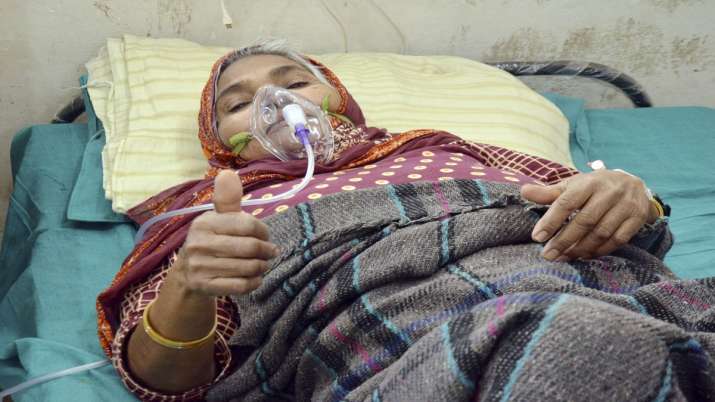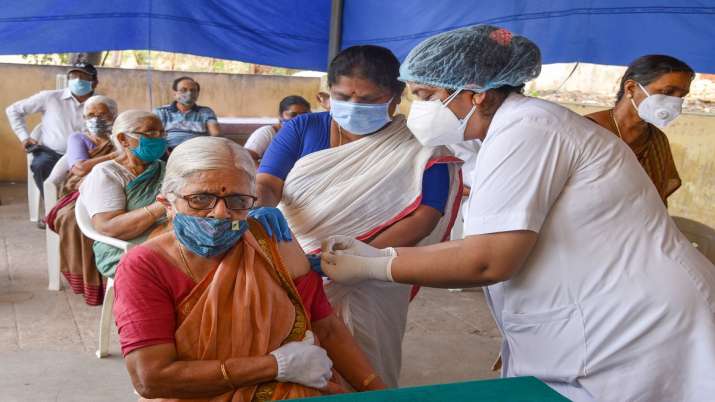[ad_1]

A COVID-19 patient shows victory sign as she fights against the disease in Ranchi.
The savage second Covid wave that wreaked havoc across the country killing thousands and infecting lakhs of people daily apart from breaking the back of medical infrastructure may finally be waning. However, the war against the deadly infection is far from over.
The government on Tuesday said that an early trend of decline in daily new COVID-19 cases and deaths has been noted in the country.
States like Maharashtra, Uttar Pradesh, Delhi, Rajasthan, Chhattisgarh, Bihar, Gujarat, Madhya Pradesh and Telangana, which were worst affected by the second wave, were among 18 states and union territories showing continued plateauing or decrease in daily new COVID-19 cases.
ALSO READ: Delhi records 12,481 Covid cases in 24 hours, positivity rate drops further to 17.8%
However, Karnataka, Kerala, Tamil Nadu, West Bengal, Punjab, Assam, Odisha, Himachal Pradesh, Meghalaya and Tripura were among 16 states and union territories were still showing continued increasing trend in daily new cases, Joint Secretary in the Health Ministry Lav Agarwal said.
Several districts showing decline in cases
Districts which are showing continued decline in cases since last two weeks include Pune, Nagpur, Palghar and Nashik districts of Maharashtra; Lucknow, Varanasi, Kanpur Nagar (Uttar Pradesh); Bhopal, Gwalior (Madhya Pradesh); Surat (Gujarat); Patna (Bihar); Ranchi (Jharkhand); Raipur, Durg (Chhattisgarh); and Kota (Rajasthan).
ALSO READ: India records 3,29,942 new COVID cases, 3,876 deaths; active cases drop by over 30,000
But there are also districts that have been showing continued increase in cases since last two weeks such as Bengaluru Urban and Muysuru in Karnataka; Chennai, Chengalpattu and Thiruvallur in Tamil Nadu; Ernakulam and Malappuram in Kerala; 24 Paraganas North and Kolkata in West Bengal; Jaipur in Rajasthan; Dehradun in Uttarakhand; East Godavari and Visakhapatanam in Andhra Pradesh; Satara in Maharashtra; and Khordha in Odisha.
Thirteen states have more than 1 lakh active COVID-19 cases each and 26 states have a positivity rate of over 15 per cent, the government said.
Stricter measures helped in reducing cases
Citing the case of Pune, Luv Agarwal said night curfew alone with no restriction on gatherings has shown less significance in terms of controlling the growth trajectory of daily new cases.
ALSO READ: Kejriwal urges Centre to share vaccine formula with other companies to scale up production
He said stricter measures such as restrictions on mass gatherings and shutting of non-essential activities for a period of 15 days have helped reduce the rate of infection growth and the cases started plateauing.

A health worker gives a dose of COVID-19 vaccine to a woman at a vaccination centre in Hyderabad.
18-20 lakh Covid tests per day
India is conducting 18-20 lakh tests for detection of COVID-19 per day, ICMR Director General Dr Balram Bhargava said, underlining that despite infection among laboratory staff, the test performance is still being maintained.
He the national COVID-19 positivity rate is around 21 per cent and about 42 per cent (310/734) of the districts are reporting a positivity rate more than the national average.
India cases decline
New cases of coronavirus in India fell to 3.29 lakh after 14 days, taking the infection tally to 2,29,92,517, the Union Health Ministry data updated on Tuesday morning showed.
A total of 3,29,942 infections were reported in a span of 24 hours, while the death toll climbed to 2,49,992 with 3,876 fresh fatalities, the data updated at 8 am showed.
After registering a steady rise for two months, the active cases have reduced to 37,15,221, accounting for 16.16 per cent of the total infections, while the national COVID-19 recovery rate was recorded at 82. 75 per cent.
(With PTI inputs)
Latest India News
[ad_2]
Source link